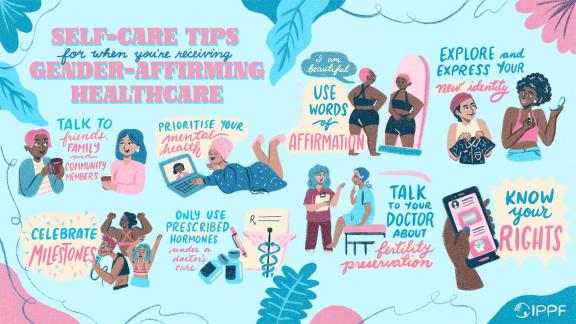Gender affirming care is a critical and empowering process for individuals who feel as though their physical appearance does not match their gender identity. There is no “right” or “wrong” way to transition, and while not all transgender and gender diverse people want to affirm their bodies through gender-affirming medical procedures, it is medically necessary for those that request it.
Gender-affirming care includes both medical and non-medical interventions that affirm a person’s gender identity through surgical procedures, hormone therapy, counseling support, as well as through social and legal transitions.
Over the years, research has proven that this treatment can significantly support a person’s wellbeing, while also reducing depression, suicide, and other devastating consequences, particularly for trans and gender-diverse young people.
For those that are thinking about or currently undergoing gender-affirming care, we’ve put together some self-care tips to help you in your journey.
Talk to friends, family or other gender diverse community members
It may take some time to figure out your true self if you are questioning or exploring your gender identity. Talking to supportive friends and family, as well as other members of the gender diverse community may help you feel validated, accepted and empowered to pursue the right care.
Seek mental health support
If you find yourself struggling with low moods, anxiety, or depression, or if you simply need to talk to someone to help you process your emotions during your transition, you can get help by talking to a mental health professional who has experience working with gender-diverse people. They can provide you with information to understand your changing mind and body, coping strategies to navigate the challenges, as well as different ways to document and celebrate your progress.
Celebrate milestones
Gender affirming care can take months or years, so you may find it helpful to document your changing body over time. Celebrate milestones such as new hair growth, changing voice, muscle gain or legal documentation of your new name and gender. Some ways to keep track of these milestones include journaling, photography, visual art, dance or music.
Only use prescribed hormones under doctor’s supervision
If hormone therapy is a part of your gender-affirming care, it's crucial to adhere to your doctor's guidelines and prescriptions. Hormones can have significant effects on your body and health, so it's essential to follow a medical professional's supervision to ensure safe and effective hormone therapy.
As more and more of our global Member Associations are responding to the sexual and reproductive health needs of these communities, we’ve prepared a new International Medical Advisory Panel (IMAP) Statement that offers essential information about gender-affirming hormone therapy, including concise clinical guidance.
Practise using words of affirmation
During this transformative process, you may experience self-doubt or negative reactions from others. Try counteracting this negativity with words of affirmation by repeating positive, uplifting statements about yourself and your journey. Some examples could be: “I am beautiful”, “I am worthy” and “I deserve to feel comfortable in my body”. Remember that you worthy of love, support and compassion.
Explore and express your gender identity
You may feel able to express your gender identity authentically for the first time once you start receiving gender-affirming care. Explore and express your true self by experimenting with different clothes, hairstyles, facial hair and makeup that resonate with your true self and help you feel more comfortable and confident in your own skin.
Consider fertility preservation
Hormone therapy can impact fertility, so if you wish to have biological children in the future, discussing fertility preservation with your doctor before starting any hormonal therapies is essential. They will be able to explain the reproductive effects, including the potential loss of fertility and the available options to preserve fertility, such as sperm banking, oocyte (egg), or embryo freezing. Exploring these fertility preservation options early on can help provide you with peace of mind.
Stay informed about your rights and legal protections
Navigating gender affirming care may involve various legal processes, such as name changes and healthcare rights. Educate yourself about the laws and protections in your country. It may be helpful to connect with local LGBTQ+ organisations who can help with legal aid and other resources.
Gender-affirming care is a transformative and individualized journey that requires love, patience, and self-care. Embrace the uniqueness of your experience and know that you deserve support and compassion throughout this process.
Other Resources:
- ILGA World – The International Lesbian, Gay, Bisexual, Trans and Intersex Association
- The Trevor Project - The leading suicide prevention organization for LGBTQ young peopleproviding support and information to LGBTQ young people 24/7, all year round.
Banner illustration by Claudine Delfin for IPPF
when









